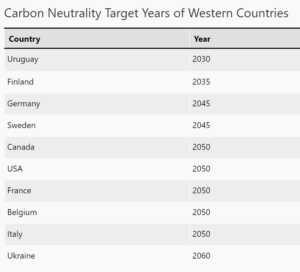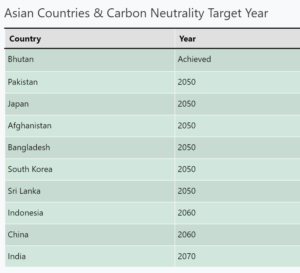By Joe Pan and Tsering Namgyal
Finland has passed arguably the world’s most ambitious climate target into law. The country aims to be the first developed country to reach net-zero, in 2035, and net negative – absorbing more CO2 than it emits – by 2040.
Indeed, the hypothesis that Asian countries are ahead of the west when it comes to achieving carbon neutrality stands false.
From a sample of 60 Western countries and 20 Asian countries it can be seen that Western countries are more conscious about achieving carbon neutrality at a faster rate with an average target year of 2048. Whereas Asian Countries have an average target year of 2052, thus lagging behind Western nations by 4 years.
Many Asian countries like Yemen have not even set a target year indicating that widespread awareness about achieving carbon neutrality is still not there in Asia.
It is also interesting to note that many underdeveloped Asian countries have set unrealistic target years for achieving carbon neutrality and haven’t taken any major steps to achieve the goal. One example is Afghanistan. It again points out to how the issue is not being taken up seriously in many parts of Asia.
While laws have been passed over the past few years in Asian countries carbon emissions have still gone up (for eg. in India and Bangladesh)
Major European countries like Germany are taking up the initiative whereas Asian Countries like China and India have set out their target years to be 2060 and 2070 which is 20-30 years after western nations like Germany and Finland.
Unfortunately, the data shows a wide contrast between Western and Asian countries when it comes to achieving carbon neutrality.
Countries like Bhutan and Suriname have already achieved carbon neutrality because of their high forest cover and low deforestation. They are considered carbon negative countries as its abundant forests absorb more GHG emissions than the country emits.
Bhutan has also used a new measurement of sustainable development based on happiness, which is heavily dependent on protecting the environment that people live in, this has helped it achieve carbon negativity.
Western Countries are unsurprisingly doing much better than Asian countries when it comes to achieving carbon neutrality. Carbon neutrality refers having a balance between releasing and absorbing carbon in the environment. This paper focuses on doing an analysis of how Asian countries compare to the West, when it comes to setting carbon neutrality targets and achieving them.

In this study, a dataset from 60 Western countries which include countries from Europe, North America and South America and 20 Asian countries was analyzed.
The purpose was to contrast and interpret whether countries are serious about achieving carbon neutrality.
From the sample, it was seen that Western countries are more conscious about achieving carbon neutrality at a faster rate with an average target year of 2048. Whereas Asian countries have an average target year of 2052, thus lagging behind Western Nations by 4 years.
It is just not the 4-year distinction that we shall want to discuss here, it is important to note that many Asian countries like Yemen have not even set a target year indicating that widespread awareness about achieving carbon neutrality is still not there in Asia.

It is also interesting to note that many underdeveloped Asian countries have set unrealistic target years for achieving carbon neutrality and haven’t taken any major steps to achieve the goal. Afghanistan, for instance, has set the target year of 2050 but since the Taliban takeover, no major steps have been taken to counter growing carbon footprint.
Major European countries like Germany are taking up the initiative and plan to achieve carbon neutrality by 2035 whereas Asian countries like China and India have set out their target years to be 2060 and 2070 which are 20-30 years after western nations like Germany and Finland. In addition to this, major carbon emitters in Asia like India and Bangladesh have witnessed an increasing carbon emission over the past few years despite their pledge to become carbon neutral.
A few countries in Asia are definitely taking up the issue seriously with countries like Japan having a decrease in carbon emissions from past years.
However, on a wider scale, the data shows a wide contrast between Western and Asian countries when it comes to achieving carbon neutrality. It points out that the issue is not being taken up seriously in many parts of Asia. The problem has aggravated over the years and the distinction between Western and Asian countries shall further increase if the present scenario continues to unfold, with developed countries becoming carbon neutral but undeveloped ones lagging behind.
About the author
Joe Pan is the contributing editor at Blockchain Asset Review
Tsering Namgyal is the chief content officer at Blockchain Asset Review
